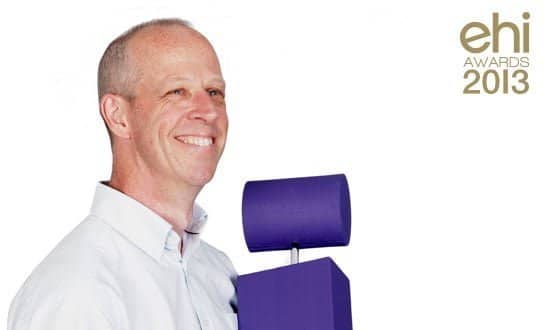Opinion formers
- 3 January 2014

When Dr James Munro, the new chief executive of Patient Opinion, thinks back over his time with the feedback service, he reflects on just how far it has come.
Dr Munro, who took over from Patient Opinion founder Paul Hodgkin on 1 January, arrived at the not-for-profit company in 2006, the year after it was launched, initially as a service for Yorkshire.
At the time, he says, there was a certain amount of skepticism about the idea. “When we started out, people essentially saw this as another version of data collection,” he reports.
With a wry laugh, he adds that: “If I were to caricature the early view of the web from the NHS it would be: ‘Oh, this is a great new way to do a survey’.”
Patient Opinion was founded on a very different understanding of the possibilities of online feedback. “This is not about collecting data on people, this is about connecting people together,” he says.
The site, which had gone national by the middle of 2007, and which has expanded into social care and Scotland, allows patients to share their experiences of healthcare, others to read them, and providers to respond. “I just think the transformative possibilities are extraordinary,” Munro adds.
A trust that sees possibilities
Dr Munro says that is especially true for trusts that share an understanding of the possibilities. One such is Nottinghamshire Healthcare NHS Trust.
Its collaborative work with Patient Opinion to deepen the use of patient feedback was recognised at the EHI Awards 2013 in association with CGI, where the two organisations won the ‘best use of social media’ category.
The trust has been using Patient Opinion for four years, but a seven month project, funded by the NHS Institute for Innovation and Improvement’s Patient Feedback Challenge, aimed to deepen and expand that use.
One key plank was increasing the number of services areas gathering feedback via the platform – significantly, that included the high security psychiatric facility Rampton Hospital, Stocken Prison and a SureStart service.
Making sure that users of services such as these are able to feedback on them does not sound like an easy proposition. Asked how it was made possible in Nottinghamshire, Dr Munro points to people working within the trust.
“To a large degree, it’s down to the skill and persistence of people within the organisation,” he says. “The people who are pushing this forward within Nottinghamshire share our belief that everybody has a voice and needs to be heard.
“It doesn’t matter who they are: they may have a mental health problem, they may be an offender, but their experience is significant and valid and may help us improve services for everybody.
“I think Nottinghamshire had a very strong reputation for user involvement and that comes right from the top of the trust, right from the chief executive; it’s a very user-centred kind of place.
“So I think they saw a potential to use Patient Opinion in a way really that goes beyond what many people think of – many people just think of it as online feedback that we respond to. But they saw the potential for using it to deepen their user involvement.”
Securing change
The figures tell the story. Since the beginning of the project, 226 patients have used Patient Opinion to share their experiences of health services provided by Nottinghamshire Healthcare NHS Trust. There have been 341 responses posted by trust staff, and experiences shared within the project timeline have led to 17 service improvements.
These impressive figures represent not just an expansion into new service areas, but an increase in the number of staff using Patient Opinion. More than 75 new members of staff have begun actively listening to, and using, patient stories over the course of the project.
“Gradually, over a period of time, the trust has started to build up not just the number of stories but also the number of staff listening to stories and the number of staff responding,” explains Dr Munro. He believes this is very important.
“Dealing with feedback, whether it’s online or not, should be something that’s everybody’s job. Improving services on the basis of the feedback that we hear is everybody’s job; it’s not just the job of the service improvement people, or the quality people or the PALS people or the complaints people.
“Because online makes that possible to do at very low cost, we can involve a lot of people. I think Nottinghamshire saw that much sooner than anybody else in the health service – doing online feedback in this kind of transparent way across large numbers of users and large numbers of staff could really help them hit a number of their goals about user involvement, service improvement, owning feedback at a local level.”
Training is essential
Training has been central in supporting this vision. Trust service user volunteers received instruction on how to use Patient Opinion, as did increasing numbers of staff. An online learning module has now been developed in collaboration with the trust, detailing how patient stories can be used.
Dr Munro sees education as a significant area of future work for Patient Opinion. “What about if we can take these stories into the educational environment where future professionals are being trained?” he asks.
“What about if we can take them into continuing professional development? In other words, they’re not just a resource for service providers; they’re a resource for educators.”
This is one of several ideas for adding to and developing the platform, which Dr Munro worked up in his old job as director of research and information.
He admits that realising those ideas will, in part, necessitate moving more organisations from the free tier of the service to the paid one (currently, around 600 organisations use Patient Opinion of which 60 – including Nottinghamshire – are on the paid tier).
“It’s a mixed blessing,” says Dr Munro. “On the one hand, we’re really happy about the situation, because it means we are able to fulfill our social mission more effectively. It’s much better to have those people using [the service] and responding to patients than sitting on their hands saying that they’re not going to join it.
“On the other hand, we would be much happier if we had a bit more resource available to develop our service more. We are very constrained by the fact that lots of people are on the free tier and not currently paying.”
Showing value to the NHS
He hopes that the experiences of trusts like Nottinghamshire will help to persuade people of the value of subscribing to Patient Opinion – and see it reach a tipping point.
“If you were thinking of Patient Opinion as a therapeutic intervention for the NHS, we probably haven’t reached a good therapeutic dose yet,” he says. “In some places, like Nottinghamshire, I’d say the dose is now becoming an effective dose. But I think we’re still running at a pretty low dose in most places.
“I think we have seen a big shift in policy, and to some degree actually a shift in culture, across healthcare towards understanding that this is actually a worthwhile thing to do, not a stupid thing to do, which is where we started! I think if that continues, we’ll be very happy.”




